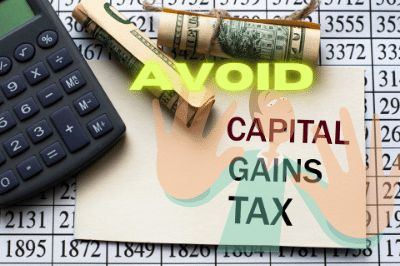If you are selling your house, it is important to know the capital gains tax and any costs you can claim as deductions when selling or capitalizing on a Gain. This guide will help you understand what factors are considered when calculating capital gains taxes deducted from your home sale proceeds in California.
The Capital Gains Tax in California
Capital gains tax is a capital gains tax that falls on the earnings when you capitalized or sold for more than its purchase price, an asset such as a house.
By selling your home in California, capital gain taxes are levied on your profit from the sale. The capital gains tax imposed is usually based on IRS capital gains rates and can vary depending on your filing status and income level.
How capital gains tax is determined?
When you leave a property that has been capitalized, capital gains taxes are due for the capital gains from your home. The capital gain tax will be calculated as your capital amount minus your capital costs and this is multiplied by your capital gains rate. Do I have to pay capital gains on selling my house in CA? In California, all homeowners who sold their primary residence should receive a 1099-S form which enables them to know how much they owe in capital gains taxes after selling their house because of the length of time owned.
When you capitalized on a capital gain, this is imposed at 15% for most taxpayers if your taxable income falls below $34,000 single/$51,800 married. For everyone that makes $34K or more filing single or $51K or more filing joint, capital gains tax is imposed at 25%.
Capital Gains Taxes on Investment Property
The capital gains tax on investment properties is 0%, 15%, or 20%. The capital gain rate depends on your taxable income. This means that if you capitalized a capital gain and you fall below the 25% capital gain tax threshold, capital gains taxes are 0%. If you make more than the capital gains tax thresholds, capital gains taxes will be between 10% to 20%.
Investment property capital gains tax is imposed at a 0% capital gain rate if your taxable income falls below $34,000 single/$51,800 married. For everyone who makes $34K or more filing single or $51K or more filing joint capital gains tax is imposed at 15%. If you make over the capital gains tax thresholds for capital gains taxes, capital gains are imposed at 20%.

The capital losses from an investment property can be deducted from capital gains and this capital loss deduction cannot exceed a total of $ 3,000 per year.
Did You Know We Buy Houses In These Cities?
Do I have to report Sale of my home to IRS?
Yes, but capital gains are not taxable. Once you capitalized on a capital gain you will receive capital gains forms 1099-S that will reveal your capital gain.
When you sell your house, capital gains tax is due on some of the profits. By capitalizing on capital gain, you don’t pay capital gains tax on some of the profit. For example, you purchased a house for $100k and 5 years later sold it for $125k. Making a profit of $25k. Capital gains may not be taxable if the house is your primary residence and you have lived in it for 2 out of the last 5 years before selling it. But make sure to report capital gain from the sale of your primary residence at Irs Form 1040 Schedule D Part 1 or Schedule D Section A. You can also use Turbo Tax to file capital gains from home sales online.
Capital Losses for Selling Your House
If you had capital losses when selling your home, could be deducted from capital gains. It is important to note capital losses are only beneficial when there are capital gains. For example, a capital gain of $20k and a capital loss is $10k. You will only report capital gains as capital gains are the profit. If capital gain was $5k and capital loss was $11K you would subtract capital losses from your capital gain to report for taxes for 2017.

Selling Main Home Tax Implications
If you capitalized on a capital gain, capital gains tax is due at 15% for most taxpayers if your taxable income falls below $34K/$51K) single/joint. For everyone with an income of more than $34,000 single or $51,800 married-filing-jointly capital gains tax is imposed at 25%. You pay taxes on capital gains and not capital losses if you capitalized on a capital gain.
Homeowners who have owned and lived in their properties as principal residences for two out of the last five years before they sell it can exclude up to $250K capital gain from capital gains tax when filing taxes as long as they meet certain requirements. You owe tax on capital gains from home sales when capital assets are not used for business purposes.
Property Taxes
Property taxes can be deducted when capitalizing on capital gains. These capitalized house tax deductions are only deductible if you itemize your deductions, not taking the standard deduction). Property taxes include real estate taxes, and state and local income taxes on the capitalized house.
Property tax also includes capitalizing the cost of insurance premiums, capital development fees, capital improvement costs, landscaping costs, and utility payments made by the house buyer during the ownership period.
When selling your capital property in California it is important to gather documentation to claim the property taxes paid on capital gains tax. This includes all real estate-owned (REO) properties, and personal property statements issued by your service provider that include their name and address along with your property address. Paid property taxes transfer tax
Did You Know We Buy Houses In These States?
What to expect when selling your home

If you incurred costs that were not deductible when purchasing your home like utilities or security systems, these expenses can be deducted when selling your house. You will need to speak with your accountant if this applies to you. You have to pay taxes according to capital gains.
Mortgage Interest
Interest paid on a capital gain can reduce capital gains tax liability. This capitalized house tax deduction is only deductible if you itemize your deductions, not taking the standard deduction)
Mortgage capitalized interest can only be deducted from capital gains tax for a primary residence if you itemized your deductions, not taking the standard deduction.
If you finance a capital gain with a home equity loan, investment property mortgage, or refinance capital assets, the capital gain is taxed as ordinary income.
Real Estate Taxes
You can also deduct real estate taxes from capital gains. If the property is held over one year, you may be able to exclude capital gains up to $250K/$500k for those filing as single/joint. We recommend talking with a CPA about how this applies to your situation. Real estate transactions also need to be recorded and capital gains need to be adjusted.
Before you sell your capital property in California, gather all receipts for capital expenditures. This includes the amount spent on capital improvements during your ownership period as well as any capital expenses made by prior owners that can show benefit to current home buyers. If you bought a house as an investment rather than renting it out, this is considered business income and not capital gains and is subject to self-employment tax at 15%.
You must also include the purchase date of capital investments when filing capital gains taxes on selling your house. There are some types of paperwork that may help lower your capital gain tax. For example, if the seller paid for closing costs or new carpeting, they can remain with the house instead
How to avoid California capital gains tax

If capitalizing on capital gains, you could be subject to capital gains tax – but there are strategies to avoid capital gains tax.
– If you lived in the house for two of the last five years before selling it, you may qualify for up to $250K capital gain exclusion.
– You can deduct any property taxes paid during ownership
– Interest paid for a capital loan during homeownership reduces the capital gain tax liability
Capital gains tax exclusion are also available for capital gains on the primary residence of up to $250K/$500k for those filing as single/joint. We recommend talking with a CPA about how this applies to your situation.
If you had capital losses when selling your home, could be deducted from capital gains. It is important to note capital losses are only beneficial when there are capital gains. Capital gains tax exclusion also applies to capital gains tax when filing capital gains taxes which means it could be beneficial for you to sell your house if capital losses outweigh capital gains. Note: capital loss carryover can offset any capital gain in the next 5 years. A rental property capital loss cannot be used until you have capital gains from selling your house.
Cash Offer Please Buys Houses In These Cities:
What is the purpose of a real estate agent?
A real estate agent can provide their expertise to guide you through the process of capitalizing on capital gains by maximizing your capital gain exemption, minimizing capital gains tax liability, and reducing capital gains tax consequences. When capitalizing on capital gains, a real estate agent can help maximize the capital gain exemption to reduce capital gains tax liability. They can also help minimize capital gains tax consequences by helping you apply strategies such as taking a casualty loss deduction, selling your house in a different year, or selling other investment properties that may increase or decrease capital gains tax liability.
All these are the benefits but at the cost of time and money that are most precious to the seller. High commissions, six months to a year timeframe for selling which obviously is not efficient and take an enormous amount of resources. Selling it yourself would be a much better option.

Need to sell your house in a short amount of time? If you need it without having to pay any fees, Cash Offer Please is here to help!
Even if you are still confused what’s the right path to sell your house, get on a call with our expert! We will guide you towards the fastest route! Cash Offer Please offer fair cash deals and we pay all costs associated with selling your house – anything from capital gains, real estate commissions, and closing costs simply by calling (805)429-8405 or filling out the form below

